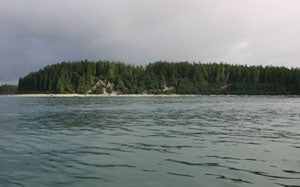  A headland on Yakutat Bay |
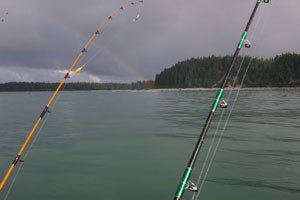  Halibut at the end of the rainbow? |
There’s so much to remember when you pack for a long fishing trip. As our plane began tilting down toward the small village of Yakutat, 10 miles from the coast in the lowlands along the Gulf of Alaska, I remembered what I’d forgotten: out of all the big things and the dozens of little things I’d remembered-seasickness patches, wader repair glue, freezer bags, ear plugs-I had no idea of the address of the lodge I’d be staying at for the next week of coho salmon fishing.
The terminal was full of people who seemed to know where they were going and reps from various lodges were holding up helpful signs, none of which sounded familiar. I was just beginning to look around for a payphone when Mr. B, a lifelong family friend and the instigator of the trip, shuffled into view through the duffels and rod cases and bearded fishermen.
“Hello boy. Get your stuff. We’re in the bar already.”
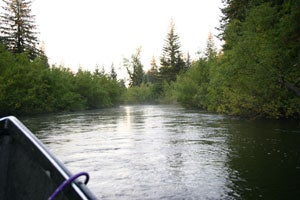  The view from the driftboat |
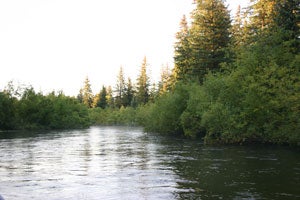  The lower Situk |
I followed him toward the exit, grateful he’d taken care of the shuttle. Instead, we walked out of the tiny terminal and within 100 feet were pushing through the saloon doors of Yakutat Lodge into a bar full of happy fisherman. The bar seemed to be on the runway. I ordered an Alaskan Amber and took in the view from the barroom window. A brilliant twin-engine floatplane stood on the gray tarmac 30 feet away and in the distance there was a row of snowy mountains.
“Welcome to Alaska, boy,” said Mr. B.
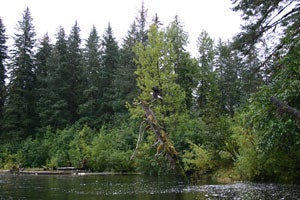  Bald Eagles were everywhere |
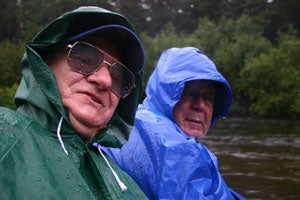  Chuck and Mr B, wet but happy |
On the West Coast of America from Northern California to the Pacific Northwest and on up to the clear waters of British Columbia and Alaska, salmon fishing is a brawling everyman’s sport carried out most often with flashing spoons, wobbling plugs, and trolled herring. With its happy harvest of meat for the cooler and wide open access, it’s the American antidote to the refinements and exclusivity of Atlantic salmon fishing. I had come to Yakutat to fish for coho or silver salmon, one of five Pacific salmon species (Chinook, also known as kings, sockeye, chum salmon, and pink salmon). August to mid-September thousands of silvers weighing into the high teens shoal into Yakutat Bay on the Gulf of Alaska to run up their birth river, the Situk, lay their eggs in the gravel and die. Like crocodiles at a river crossing, a black-hearted gang of predators-sea lions, killer whales, brown and black bears, egg-stealing char, and waterproofed anglers-hope to meet them on the way.
9 Mile Bridge
On our first day we put the driftboat in at 9 Mile Bridge and Idaho John, an experienced driftboat captain, kindly took the oars. All the fuss and anxiety of bopping on and off airplanes, gathering equipment, and making arrangements dissipated in the mist of the early morning river. Bald eagles criss-crossed the river downstream of us trying to stay out of our way, and John had to steer the boat around an obstacle course of fallen trees that threw zigzags into the current. The dark water reflected dense stands of Sitka spruce and rust-colored ferns close to the river edge on both banks
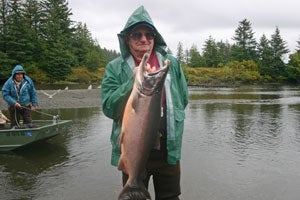  Chuck with a good salmon |
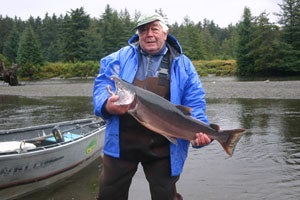  Mr B with a 15lb silver |
The Yakutat area is home to a healthy population of black and brown (i.e., grizzly) bears and we hadn’t been on the water very long before our first sighting. Coming into a stretch of straight water, some distance in front of us a disembodied teddy bear head began pushing out from the right bank and smoothly crossed the river. It immediately disappeared into the ferns but rattled the undergrowth as we drifted past. From the distance we couldn’t tell if it was a black or a grizz.
John instructed us in art of fishing for silvers. As they run up a river to spawn, silvers typically try to preserve their strength and energy by ducking into any available slack or still water. With John veering across the river to hit the limpest holes, Chuck, me, and Mr. B dropped our silver Pixie spoons into every back eddy, scum line, and side pool we could cast to. And within an hour the silvers began to hit in the sunshine.
The smaller, brighter females up to eight or nine pounds would take the spoon and flash upward in an arc for a second while they processed the strange new feeling. The larger, tinted males would smash the lure and power off, the rod tip bowing and nodding its approval. A Dolly Varden, pretending to be a salmon, hit my spoon in irritation. Dollies are char with cucumbery green coloration and pale green and white spots. As spawning approaches their colors catch alight into brilliant red spots above a solid red underside and the fins develop a thick white band on the outer edge. Though the history of its naming is a little murky, with a literary flourish someone somewhere made the connection between its spawning colors and the green and red dotted dresses of the character Dolly Varden in Dickens’ “Barnaby Rudge,” and the name stuck.
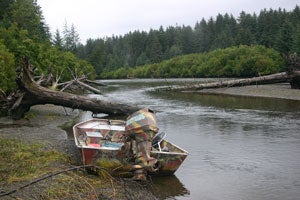  Somebody likes their camo |
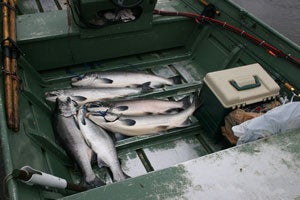  Half a dozen salmon fresh from the ocean |
After an eight hour float we beached ourselves at the takeout within sight of Yakutat Bay. There were half a dozen salmon in the cooler and one or two crushed beer cans, and though tired, cold, wet, and stinking of fish, I was profoundly happy. Time for a shower. Time for a steak.
11 Feet of Rain
In recent years the storm-whipped Bay of Yakutat has become an unlikely destination for adventurous Northern surfers attracted by its reliable waves, but you’re never likely to confuse this place with California. Huge rainfall systems generated by the roiling Gulf of Alaska are checked from moving inland past the coastal lowlands by the St. Elias mountain range, and they take it out on the place by dropping around 130 inches of rain on Yakutat during a typical year. So it was entirely expected that following our blue sky debut, day two broke with slate colored skies and heavy showers. Rather than commit to a sodden seven or eight hours confined to a driftboat, several members of our party drove to the mouth of the Situk and motored up river by attaching an outboard to the back of a driftboat.
Two of us abandoned ship after about an hour and cautiously began to wade the river. It was liberating to be in the water, rolled by the current. The Situk in this section shelved from one to two feet to waist level to just beyond where it was possible to stand. You knew you were at your limit when you felt yourself being slowly but irresistibly nudged downstream, like getting pushed along by the wet nose of a giant dog. Just in front of me ragged pink salmon were darting upriver in twos and threes.
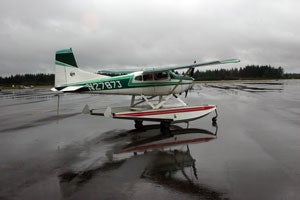  The view from the barroom window |
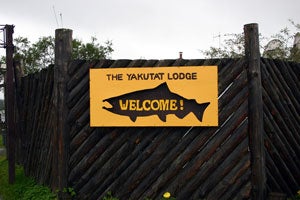  Welcome to the lodge |
We were using the same silver Pixie spoons with either a fluorescent green or red strip attached to one side. After a small fish flashed on the lure but didn’t connect I noticed some persistent boils and rises in front of a massive fir tree that had rolled into the river parallel to the bank.
It was too deep to get close enough for accurate casts so I waded below the tree and round and up into the shallow water between the tree and the bank. Several of its branches were decorated with Pixie spoons and lures. I put five in my pocket from one branch. I clamboured on to the main trunk and began jigging the spoon through the sweet pockets of deep water in between the tangle of tree limbs. I could see silver flashes in the water deep down tight to the limbs and twice fish as long as your arm ghosted up under the lure as it struggled to the surface. One hit and cartwheeled briefly over and under the tree limbs before it shed the hook.
After an hour of tree jigging our driftboat party appeared from upriver to pick us up and with the rain increasing, we decided to head for the takeout. Idaho Neil, one of the more ‘results orientated’ members of the party took the oars and barked at us to “Pound the shit out of them holes, boys.” Which we did. A six pounder nailed my spoon on one of the last stretches before the takeout and as it flopped on the gravel Neil Yahooed loud enough to send an eagle flapping up the river. He carries a shotgun with him when he’s on the Situk after a previous encounter with a too persistent grizzly. I couldn’t tell if he was genuinely happy about the fish or there was a sarcastic edge to it because it was a bit on the small side. Either way, I wasn’t going to argue.
Halibut Postponed
The previous day Chuck and Mr. B, septuagenarian salmon fishers who are a bit too sensible to spend eight hours filling with rainwater by the side of a cold river, holed up in the lodge bar for most of the day, filling with whiskey and remembrances. They were there to hear the story of a 200-pound halibut that had been caught by one of the saltwater charters that day and was now hanging up outside the lodge before being filleted into an almighty mother lode of freezer bags. I didn’t get to see that great fish but it was swimming in my thoughts the next day as we headed out in rough seas for the halibut grounds. Laurie, our captain, was an enthusiastic, engaging lady with the tight complexion of someone who spends a lot of time outdoors in less than ideal weather. She rigged huge circle hooks with salmon heads and we dropped them to the bottom in about 140 feet of water. Cranking a couple of turns of line onto the reel set the heads bobbing just off bottom, where the halibut lay in terrible ambush …. After an hour all we’d caught were small sharks, some of which would slowly follow the bait all the way up to the boat, no doubt curious about the reanimated heads.
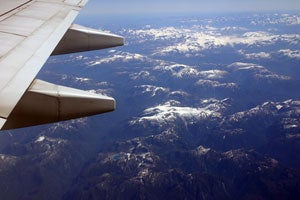  Flying in over British Columbia |
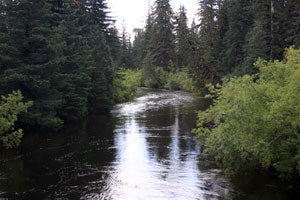  The upper Situk |
The weather began to blacken and it was decided to head inshore and troll for salmon. In the quick way these things can happen on a boat, the anchor rope became entangled in the prop of one of the outboards. Somebody was waving around a long-handled gaff to help untangle the rope and it accidentally pierced the anchor buoy, which marks where the anchor sits on the bottom. The buoy filled with water and disappeared. Things became a little tense. Rather than cut the anchor rope and head in, Laurie motored around in wide circles to throw slack into the rope and then gathered it in by hand. When we were directly over the anchor she hauled it and the deflated buoy up single-handedly from the bottom. We had all offered to help, but as captain she wanted to take care of it herself. Mr. B, slumped in the cabin with his chin resting on the rim of a bucket, wasn’t feeling so good, and with the weather unimproving we decided to head in for the day.
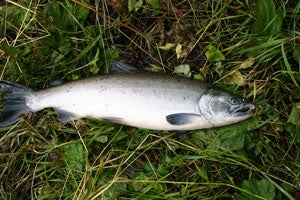  A good fish, bright against the bankside rushes |
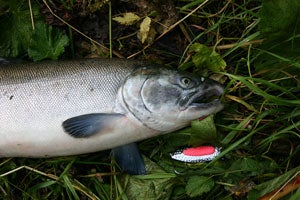  The silvers liked their pixies |
That afternoon five of us hiked through a jungly rainforest with Neil singing loudly to the bears, and fished a small stream tributary of the Lost River called Tawah Creek. To my unschooled eye it seemed too insubstantial to hold salmon. Within a couple of hours I had caught two of about 10 pounds and Idaho John had caught three, each one improbably bright and silver against the dull greens and browns of the bankside rushes we laid them on.
Charlie the Terrible
That evening we met our new captain for the next day’s repeat ocean charter. There was a lot of noise in the dining room and he’d clearly had a drink or two but after a few introductions, out of the din I was pretty sure I heard him mumble, “I’d sooner shoot a man than a halibut. Halibut never did anything to me.” For safety reasons, charter captains often dispatch halibut with a shot to the head once they’ve been brought to the boat and it’s established they’re within size limits. I looked around but nobody had been listening, or if they had they were pretending to be casual. ‘Charlie’ turned out to have the kind of resume more than up to the job of defending a few oversized flatfish. He was a babyfaced hardman who’d grown up commercial fishing the Oregon Coast then joined the army, and there was quite a bit of talk of his time overseas in the elite military killing people who didn’t like America. I just hoped he’d help me catch a hali…lingcod.
Page 2 ‘Silvers in the Great Land’












